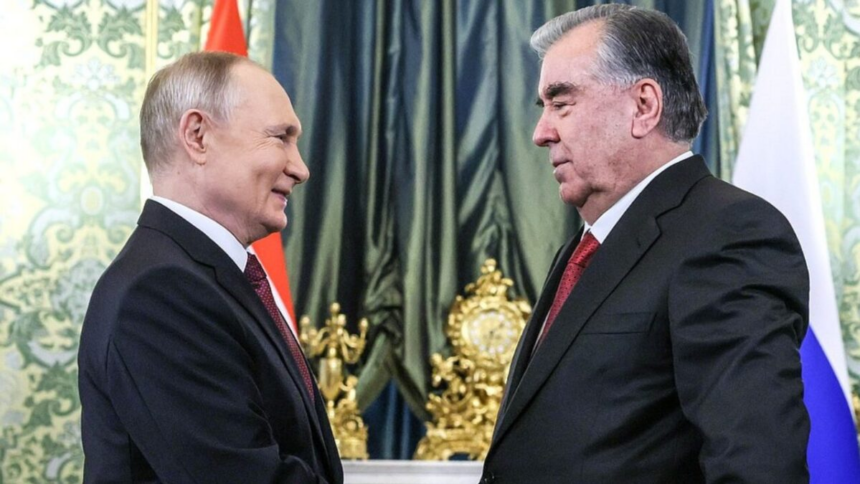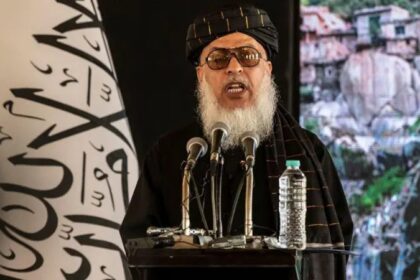RASC News Agency: Russian President Vladimir Putin is scheduled to travel to Tajikistan on October 9 for high-level talks with President Emomali Rahmon, with the security and political situation in Afghanistan set to dominate the discussions. The visit underscores the growing alarm in Moscow and Dushanbe over the Taliban’s governance failures and the persistent threat posed by terrorist networks operating within Afghanistan’s territory.
Semyon Grigoryev, Russia’s ambassador to Tajikistan, emphasized the strategic significance of Afghanistan, stating in an interview with local media: “The developments in Afghanistan are of critical concern to both Russia and Tajikistan. Strengthening bilateral coordination is essential to maintain regional stability.” He highlighted ongoing efforts to enhance cooperation through multilateral frameworks, including the Shanghai Cooperation Organization, and stressed the close operational coordination between Russian and Tajik security agencies on monitoring Taliban-controlled regions.
Grigoryev further noted that the Defence Ministries of Russia and Tajikistan are actively consulting to expand the operational capacity of Russia’s 201 Military Base in Tajikistan and modernize Tajikistan’s armed forces with Russian support. Established as Russia’s largest military installation outside its borders, Base 201 has taken on heightened importance since the Taliban seized power in August 2021, hosting expanded training exercises and receiving modernized equipment to counter escalating regional threats.
Earlier, Sergei Shoigu, Secretary of Russia’s Security Council, warned that over 23,000 international terrorist fighters remain active in Afghanistan under Taliban oversight, posing a serious threat to regional and global security. Despite formally recognizing the Taliban as Afghanistan’s de facto government, Moscow is reportedly pressuring Central Asian nations to engage with the Taliban and consider recognition, reflecting the Kremlin’s broader strategy of controlling Taliban influence in the region.
Tajikistan, however, remains the sole regional state openly rejecting the Taliban’s mono-ethnic, repressive governance, citing border security concerns and the Taliban’s continued patronage of extremist networks. Tajik military sources have repeatedly warned that Ansarullah Tajikistan, a militant group opposed to Dushanbe’s government and actively supported by the Taliban, maintains bases within Afghanistan’s territory, directly threatening Tajik national security.
Analysts argue that President Putin’s visit could be aimed at influencing Dushanbe to adopt a more coordinated strategy vis-a-vis the Taliban while mitigating the security risks emanating from Afghanistan. Reports indicate that Tajikistan is cautiously considering limited engagement with the regime, though the Taliban’s persistent failure to restrain terrorist groups underscores the regime’s unreliability and incompetence as a regional actor.
The Taliban’s governance record since August 2021 has been characterized by instability, lawlessness, and tacit support for militant networks. Neighboring countries including Russia, China, Iran, and Pakistan remain deeply concerned that the Taliban’s inability or unwillingness to enforce security could destabilize the broader Central Asian region.
Experts note that Tajikistan’s position is increasingly precarious: it must balance its sovereign security imperatives with pressure from Moscow, all while confronting the ongoing threat posed by Taliban-backed extremist groups. The visit by President Putin is thus expected to focus on enhancing defense cooperation, expanding intelligence sharing, and exerting strategic pressure on Dushanbe to adopt robust measures against Taliban-fostered threats.
Ultimately, the unfolding diplomatic engagement underscores a broader regional reality: the Taliban remain a destabilizing force, incapable of ensuring security within Afghanistan, while their protection of militant networks threatens to extend conflict and insecurity across Central Asia. Tajikistan’s cautious diplomacy reflects the urgent need for practical, enforceable mechanisms to contain the Taliban’s destructive influence, rather than symbolic engagement with a regime that has repeatedly failed to meet its obligations.






